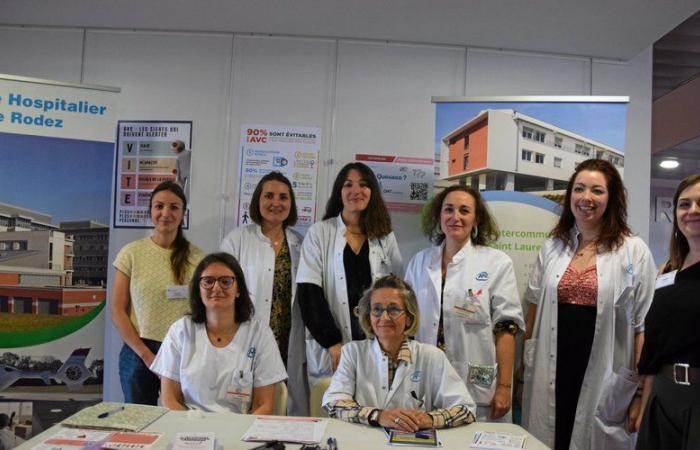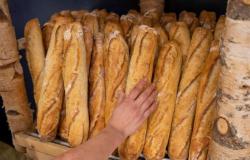
On the occasion of World Stroke Day, Rodez hospital raised public awareness on Tuesday October 29, 2024.
Who doesn’t have someone around them who has had a stroke in their life? Stroke known as “brain infarction” among health professionals concerns everyone. And at any age, although the risk is lower among young people, stroke increases among them.
Alcohol, tobacco, obesity, diabetes…
One factor is the use of alcohol and tobacco (including cannabis). Hypertension, smoking, cholesterol, diabetes, obesity, cardiac arrhythmia are the main causes. Causes and explanations given on Tuesday October 29, for the first time, in the hall of Rodez hospital as part of World Stroke Day.
The multidisciplinary medical and paramedical team from the neurology department of Rodez and the rehabilitation team from Espalion hospital were attentive around stands and posters in hand, to answer questions. And reassure. “Prevention is essential, particularly for stroke where treatment time is vital. Stroke is not inevitable, life afterward is possible”says Marie Lassiaille, speech therapist. And to add: “The message is intended to be positive.”
A race against time
Indeed, the range of competent people (neurologist, nurse, physiotherapist, occupational therapist, dietitian, speech therapist, social worker, neuropsychologist, etc.), demonstrates effective care. As long as it is quick. A race against time begins, hence the hammered message: up to 4:30 hours after the start of symptoms to intervene and avoid the after-effects because “the objective is to reduce the impact on daily life” remind health professionals. Recovery extends over two years, the first six months are the most important. A number to remember: dial 15. Because every minute, the patient loses on average 1.9 million brain cells. The quicker the treatment, the less severe the after-effects.
Every detail counts
A third of patients have a severe disability, another third have a moderate disability and a third have no after-effects. Hence the prevention and speed of treatment. “Nothing is trivial. Every detail counts. You have to be attentive to the smallest detail, anomaly”continues Marie Lassiaille who helps to “find the words”, participates in swallowing.
Progress, particularly in magnetic resonance imaging (MRI) since 2012, works in favor of the patient. Therapeutic management of strokes, particularly that of non-hemorrhagic strokes (known as ischemic strokes), has evolved considerably. Just yesterday, Dr. Gourari, on duty, was called in for a stroke. The neurologist prescribed the medication and referred the patient to the neurovascular unit of the Toulouse hospital center in Purpan.
Intravenous fibrinolysis to dissolve the clot, mechanical thrombectomy to remove the clot, the methods respond to each specificity of a stroke. Which made the medical team say: “We offer comprehensive and adapted support, it’s enriching.”
The causes are known. Hypertension sometimes hereditary. There still remains a part of the unknown such as stress which explains the increase in cases of stroke in our society. With one in six people affected by a stroke in their lifetime, it’s a lottery too. Like the communication campaign launched yesterday by the Regional Health Agency revealing a game card on which is written: the winning number, 15.
By the numbers
40 people suffer a stroke every day in Occitania, 20 will remain seriously disabled for life and 5 will die.
140 000 people suffer from stroke every year in France.
1st cause of acquired disability in adults, with patients who have serious after-effects, 2nd cause of dementia, 3rd cause of mortality in France (40,000 deaths), leading cause of mortality in women.
90 % cases of stroke occur from the age of 50.
1 in 6 people will have a stroke in his life.
80 % of cases are due to a blocked blood vessel, 20% of cases due to tearing of a blood vessel causing hemorrhage in the brain.
2008date when the mortality rate decreased by almost 13% among seniors, unlike younger people who are increasing.
90 % strokes are preventable.


